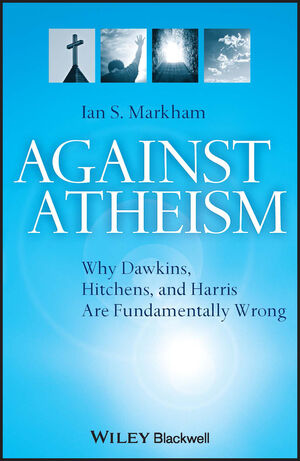Against Atheism: Why Dawkins, Hitchens, and Harris Are Fundamentally WrongISBN: 978-1-4051-8963-7
Paperback
176 pages
February 2010, Wiley-Blackwell
 Other Available Formats: Hardcover
|
||||||
Connect with Wiley Publicity
It is hard to ignore the slew of pro-atheism and anti-atheism books published in recent years. The debate has certainly tapped into the public consciousness, and resonates beyond the fields of religion and science. Ian Markham’s AGAINST ATHEISM: Why Dawkins, Hitchens, and Harris are Fundamentally Wrong (Wiley-Blackwell, January 2009 (U.S.); December 2009 (UK)) stands out from the crowd by questioning the theological, ethical, and spiritual content underpinning books by Dawkins, Hitchens, and Harris. By challenging the very foundations of their position, he exposes the weaknesses in their arguments. For example, is a kind of post-9/11 hysteria at the root of some of the anti-faith arguments? If so, is this evidence that the atheism debate is infiltrating cultural and social attitudes to different faith groups?
Markham uses examples from Nietzsche, one of the true founders of atheism, who in his lifetime struggled with the personal, moral, societal, and scientific implications of the absence of God. In comparison to Nietzsche, Markham perceives Dawkins, “A middle-class university atheism. He is providing a very benign, quite attractive, Oxbridge atheism. If you look closely, you can see the conversations and humor of the university common room, his affection for the King James’ version of the Bible, and his love of choirs.”
Markham believes that the pervasive anti-faith attitude, perpetuated by “the atheist trio,” discourages and mocks the “spiritual sense” and sense of wonder that is at the root of real faith. Unlike the creationists, who pair evolution with their own convenient claims of God’s intervention, Markham sees a certain degree of uncertainty or mystery (and fascination with the scientific world) as a necessary component in developing a healthy “spiritual sense.” Markham asserts that without a common moral language for believers and non-believers the arguments on both sides fall flat.
He incorporates discussions on cosmology, Freud, physics (the more faith-friendly science) and biology (Dawkins’ field of study). Although Markham is critical of the lack of depth in the trio’s research he concedes that, “Atheism is not a silly worldview. At certain points in many lives, doubt may arise as we struggle with certain particular questions … We need to recognize that there is a challenge embedded in these books.” He confronts this challenge on all points and asks the reader to examine the motivations of the trio and their overconfident claim that a higher power cannot and does not exist.



